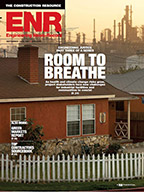Kerry S. Woods' wait for justice regarding his sexual harassment case will have to wait longer. Last month, a federal appeals court reversed a jury verdict and an award of $301,000 that Woods and the federal Equal Employment Opportunity Commission won last year from contractor Boh Brothers Construction Cos. In effect, the ruling said the case did not meet the legal threshold because the victim exhibited traditional masculine behavior.
The case involves a Boh supervisor who tormented Woods by calling him "homo" and "faggot" while they worked in New Orleans on the I-10 Twin Span bridge reconstruction project in 2009. The harassment, which included incidents such as the supervisor exposing himself and simulating sex with Woods, made the $18.76-an-hour ironworker miserable during his time on the job.
Neither Boh nor the appeals court judges deny the supervisor, Charles Wolfe, did these things. Boh has called Wolfe's behavior unacceptable and no longer employs him. But the appeals court judges decided the Equal Employment Opportunity Commission's (EEOC) case was based on a "novel" legal theory that crude behavior between men is a violation of the law. For that to be true, they claimed, the victim must fail to conform to a gender stereotype.
Letting Boys Be Boys?
"It is not the business of the federal courts generally to clean up the language and conduct of construction sites," the judges ruled.
Unfortunately for Woods, that wasn't the issue. Wolfe's unrelenting harassment created a hostile work environment for Woods that no employee should have to endure. The judges' characterization of the behavior as fun-lovin' horseplay and needling by Wolfe misses the whole point of statutory protection for employees. Had such persistent abuse been handed out, say, in the courthouse judges' lounge by the chief administrative judge against the newest member of the federal bench, the unlawfulness of the harassment would have been apparent.
Instead, the ruling creates a second-tier workplace category for construction by condoning Wolfe's actions as "non-sexual" trash-talking because neither Woods nor Wolfe was "effeminate." What's more relevant is that Woods declined to join a union amid unionized workers, which is his right. (Boh also runs a non-union unit.) Wolfe and others showered Woods with terms such as "rat" before Wolfe shifted to sexual humiliations and attacks on Woods' masculinity.
During the jury trial, Boh's lawyer tried to portray Woods as a malcontent, but it didn't fly. The jury saw Woods as a worker who endured the abuse to avoid taking a job elsewhere that may have forced him to commute long distances or live apart from his family.
Given the serious nature of the charge, EEOC should push for Supreme Court review of the case.




Post a comment to this article
Report Abusive Comment